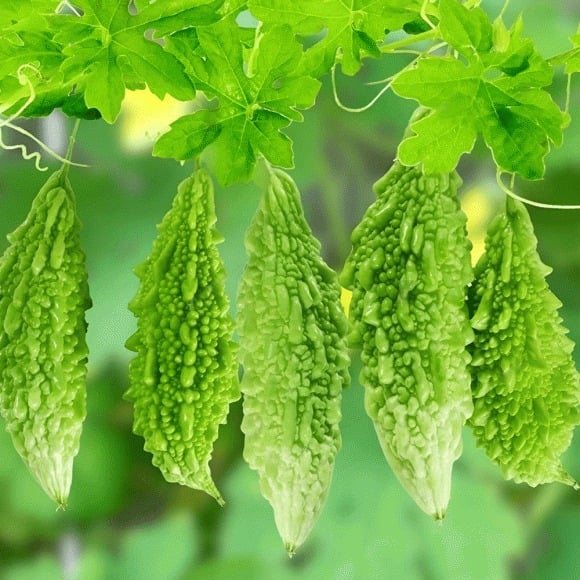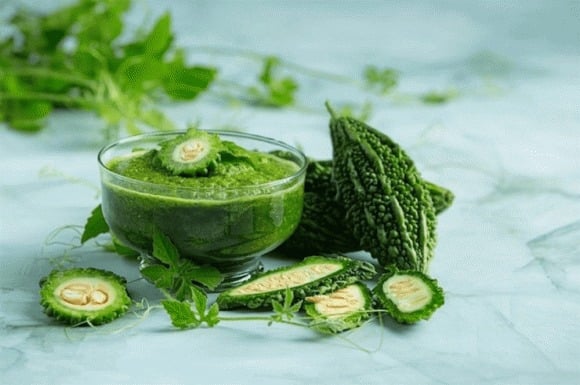Bitter melon, also known as bitter gourd or bitter squash, is a familiar ingredient in Vietnamese cuisine and is considered a “green wonder drug” for health.
For a long time, this fruit has been used in traditional medicine for its amazing benefits such as cooling and detoxification, supporting diabetes treatment, skin beautification, and especially its effective anti-cancer ability.
Anti-cancer properties of bitter melon: Scientific studies provide evidence
Numerous modern scientific studies have provided solid evidence of bitter melon’s anti-cancer properties. A study by the University of Colorado (USA) proved that the active compounds in bitter melon can inhibit the growth and duplication of cancer cells. Notably, bitter melon can also induce cancer cells to enter a state of “suicide,” helping to prevent their spread in the body.

Additionally, studies from India have also proven the anti-cancer effects of bitter melon. In one experiment, an extract from bitter melon was used to affect cancer cells, and the results showed that the extract could interfere with the molecules that transport sugar and fat in the body.
Since cancer cells require a large amount of nutrients to grow, inhibiting these molecules helps to “cut off” their supply, thereby slowing down their development.
This research suggests that bitter melon can impact various types of cancers, including breast cancer, prostate cancer, and head and neck cancers.
Apart from its direct effect on cancer cells, bitter melon is also rich in vitamin C, protecting the body from free radicals that cause aging and chronic diseases, including cancer.
Bitter melon also contains valuable nutrients such as flavonoids, polyphenols, and beta-carotene, all of which play a crucial role in supporting the immune system, reducing inflammation, and preventing the formation of cancer cells.
However, despite its health benefits, if bitter melon is used incorrectly or overdosed, it may cause side effects such as severe hypoglycemia, digestive issues, or allergies in some individuals. Therefore, it should be used with caution:
Do not eat too much bitter melon in a day.
Pregnant women and people with low blood pressure should limit their consumption.
It is best to cook bitter melon by boiling, stir-frying, or making soup to retain its nutritional value.
With its scientifically proven superior benefits, bitter melon is not only a delicious dish but also a “natural weapon” to prevent cancer and protect comprehensive health.
Foods that should not be combined with bitter melon for health reasons
Although bitter melon is a nutritious food, not everyone knows that when combined with certain other foods, bitter melon can cause unwanted side effects. Here are some foods you should avoid eating with bitter melon to protect your health.

Bitter Melon and Shrimp: Risk of Arsenic Poisoning
Shrimp contains a small amount of organic arsenic (pentavalent arsenic), which is harmless when consumed in normal amounts. However, when combined with bitter melon, which is rich in vitamin C, the vitamin C can promote the metabolism of pentavalent arsenic into trivalent arsenic (a toxic substance) that can cause severe poisoning.
Although the amount of arsenic in shrimp is not significant, long-term combination with bitter melon may still lead to toxicity. Moreover, this combination can also cause indigestion and bloating due to the cooling nature of bitter melon and the warming nature of shrimp. Therefore, it is best not to eat bitter melon with shrimp to avoid health issues.
Bitter Melon and Fried Pork Ribs: Impaired Calcium Absorption
When bitter melon is consumed with fried pork ribs, calcium oxalate can form in the body, reducing calcium absorption and impacting bone health. This compound can interfere with calcium absorption and increase the risk of osteoporosis, especially for those prone to calcium deficiency.
Additionally, calcium oxalate can also deposit in the kidneys, increasing the risk of kidney stones. Therefore, avoid combining bitter melon and fried pork ribs to ensure effective calcium absorption.
Bitter Melon and Green Tea: Stomach Irritation
Bitter melon has a cooling property, and green tea also has a cooling effect. When combined, they can irritate the stomach, leading to digestive issues such as stomach pain, indigestion, and nausea. This is especially dangerous for those with a weak digestive system or stomach ailments like gastritis and acid reflux. If you want to drink green tea, wait at least 2-3 hours after eating bitter melon to avoid stomach irritation.
Bitter Melon and Parsley: Cold Stomach and Diarrhea
Both bitter melon and parsley have high cooling properties, helping to cool and detoxify the body. However, when combined, they can disrupt the body’s temperature balance, impairing digestive functions and leading to bloating, diarrhea, and cold stomach. Especially for those with a cold body constitution, weak digestion, or a tendency for digestive disorders, avoid combining these two foods, especially when eaten raw. If you want to use both, cook them thoroughly and consume in moderation to minimize side effects.
Bitter Melon and Mangosteen: Digestive Disturbances
Both bitter melon and mangosteen have cooling properties, and when combined in the same meal, they can reduce the body’s digestive capacity, causing bloating, digestive disorders, and even diarrhea.
Consuming too many cooling foods simultaneously will decrease metabolic function, leading to fatigue, nausea, and digestive issues. If you want to eat both bitter melon and mangosteen, space them at least 2-3 hours apart to allow better digestion and avoid gastric and intestinal problems.
Thus, to optimize the benefits of bitter melon and protect your health, be mindful of avoiding these food combinations.



































